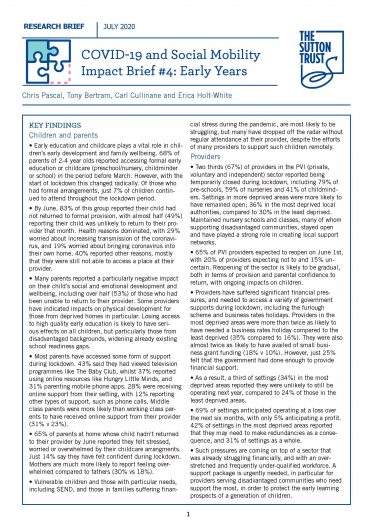Children and parents
• Early education and childcare plays a vital role in children’s early development and family wellbeing. 68% of parents of 2-4 year olds reported accessing formal early education or childcare (preschool/nursery, childminder or school) in the period before March. However, with the start of lockdown this changed radically. Of those who had formal arrangements, just 7% of children continued to attend throughout the lockdown period.
• By June, 83% of this group reported their child had not returned to formal provision, with almost half (49%) reporting their child was unlikely to return to their provider that month. Health reasons dominated, with 29% worried about increasing transmission of the coronavirus, and 19% worried about bringing coronavirus into their own home.
• Many parents reported a particularly negative impact on their child’s social and emotional development and wellbeing, including over half (53%) of those who had been unable to return to their provider. Losing access to high quality early education is likely to widen already existing school readiness gaps.
• Most parents have accessed some form of support during lockdown. 43% said they had viewed television programmes like The Baby Club, whilst 37% reported using online resources like Hungry Little Minds, and 31% parenting apps. Middle class parents were more likely than working class parents to have received online support from their provider (31% v 23%).
• 65% of parents at home whose child hadn’t returned to their provider by June reported they felt stressed, worried or overwhelmed by their childcare arrangements. Mothers are much more likely to report feeling overwhelmed compared to fathers (30% vs 18%).
Providers
• Two thirds (67%) of providers in the PVI (private, voluntary and independent) sector reported being temporarily closed during lockdown, including 79% of pre-schools, 59% of nurseries and 41% of childminders. Settings in more deprived areas were more likely to have remained open; 36% in the most deprived local authorities, compared to 30% in the least deprived.
• 65% of PVI providers expected to reopen on June 1st, with 20% of providers expecting not to and 15% uncertain.
• Providers have suffered significant financial pressures, and needed to access a variety of government supports during lockdown, including the furlough scheme and business rates holidays. Providers in the most deprived areas were more than twice as likely to have needed a business rates holiday compared to the least deprived (35% compared to 16%). They were also almost twice as likely to have availed of small business grant funding (18% v 10%). However, just 25% felt that the government had done enough to provide financial support.
• As a result, a third of settings (34%) in the most deprived areas reported they were unlikely to still be operating next year, compared to 24% of those in the least deprived areas.
• 69% of settings anticipated operating at a loss over the next six months. 42% of settings in the most deprived areas reported that they may need to make redundancies as a consequence, and 31% of settings as a whole.
• A support package is urgently needed, in particular for providers serving disadvantaged communities who need support the most, in order to protect the early learning prospects of a generation of children.
